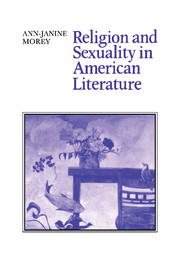Book contents
- Frontmatter
- Contents
- Acknowledgments
- Introduction
- 1 Body Language: Religion, Sexuality, and the Bioluminescence of Metaphor
- 2 The Stubborn Density of Desire: Religion and Sexuality in Nineteenth-Century Fiction
- 3 A Tradition of Divine Lechery: Men Write about the Ministry
- 4 A War of Words: Women Write about the Ministry. The Homiletic writers
- 5 Comfort to the Enemy: Women Write about the Ministry. The Parsonage Romance
- 6 The Fox in the Well: Metaphors of Embodiment in the Androcentric Imagination
- 7 Fatal Abstractions: Metaphors of Embodiment in the Gynocentric Imagination
- 8 Conclusion: Words Are Not the Thing Itself
- Appendix A The Homiletic Novels and Their Authors
- Appendix B The Parsonage Romances and Their Authors
- Bibliography
- Index
- Cambridge Studies in American Literature and Culture
4 - A War of Words: Women Write about the Ministry. The Homiletic writers
Published online by Cambridge University Press: 25 March 2010
- Frontmatter
- Contents
- Acknowledgments
- Introduction
- 1 Body Language: Religion, Sexuality, and the Bioluminescence of Metaphor
- 2 The Stubborn Density of Desire: Religion and Sexuality in Nineteenth-Century Fiction
- 3 A Tradition of Divine Lechery: Men Write about the Ministry
- 4 A War of Words: Women Write about the Ministry. The Homiletic writers
- 5 Comfort to the Enemy: Women Write about the Ministry. The Parsonage Romance
- 6 The Fox in the Well: Metaphors of Embodiment in the Androcentric Imagination
- 7 Fatal Abstractions: Metaphors of Embodiment in the Gynocentric Imagination
- 8 Conclusion: Words Are Not the Thing Itself
- Appendix A The Homiletic Novels and Their Authors
- Appendix B The Parsonage Romances and Their Authors
- Bibliography
- Index
- Cambridge Studies in American Literature and Culture
Summary
Errant ministers suffer a variety of mutilations and humiliations for the transient pleasure of sexual intrigue: lynching, drunkenness, paralysis (and other forms of symbolic and literal castration), ostracism by public scorn and ridicule, death (by drowning: in rivers, wells, guilt), and madness. The hazards of the ministry relative to sexuality are well documented in fiction, but the consequences portrayed may be more a product of the suggestive rather than mimetic function of literature. That is, poetic justice is not the same as actual justice, and literature may not be used uncritically as sociological evidence. Only the polemic of Lewis's Elmer Gantry comes close to reporting another aspect of the tradition of divine lechery. Elmer Gantry is nearly exposed several times in his career, and yet he flourishes wherever next planted, both because of his own psychic agility and the unwillingness of his congregations to see more than pleases them. More than most, Lewis underlines the congregational complicity in Elmer's successful recoveries. In fact, congregations are as apt to forgive an errant clergyman as they are to run him out of town. This is not simply a matter of Christian charity, for the same generosity may not be extended to the female participant. The history of Henry Ward Beecher and Elizabeth Tilton provides an instructive and documented dramatization of this outcome.
Henry Ward Beecher, known for his preaching of a comforting love religion, was the pastor of the powerful and wealthy Plymouth Church in Brooklyn Heights. Elizabeth Tilton was a parishioner and the wife of a friend, Theodore.
- Type
- Chapter
- Information
- Religion and Sexuality in American Literature , pp. 104 - 140Publisher: Cambridge University PressPrint publication year: 1992

